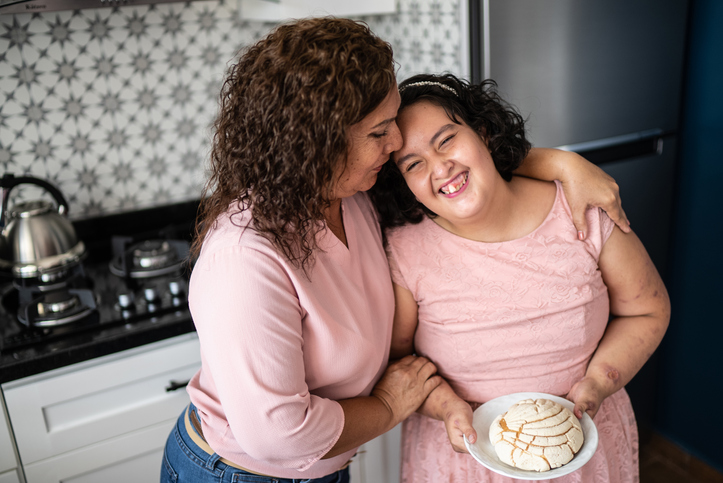Category: Disability
Love in the Final Chapter: Caring for a Loved One in Home Hospice
October 15, 2025

When it comes to end-of-life care, 71% of Americans believe the goal should be to help people die without pain, discomfort, and stress. The focus of hospice care is on quality of life and symptom management, and it is designed to provide comfort to individuals with a life expectancy of six months or less.
A team of medical professionals addresses the patient’s physical, psychological, and spiritual needs on a case-by-case basis, ensuring that every patient receives a care plan tailored to their specific needs. Care is most often delivered in the patient’s home, and the hospice team can support caregivers during this process.
Quality is Key
Hospice is end-of-life care, but that doesn’t mean someone receiving care will pass right away. While doctors recommend hospice when a patient only has six months or less to live and is no longer responding to curative treatments, many patients live longer. In such cases, what matters still is a patient’s quality of life, not quantity.
“Each person’s journey at the end of life is different,” says Jessica Kelly, a licensed hospice nurse in New York. “We tailor our care to meet those unique needs, whether that’s managing pain, supporting emotional well-being, or helping families share meaningful moments together.”
Home Care Takes a Toll
While it is nearly everyone’s preference to pass away in the comfort of their own home, the task of caregiving can be more than loved ones expect. “I do think that when patients are at home, they are in a peaceful environment,” says Parul Goyal, a palliative care physician. “It is comfortable for them. But it may not be comfortable for family members watching them take their last breath.”
The burden put on loved ones, especially spouses, can cause caregiver syndrome, which is characterized by the stress and burnout that comes from providing constant care to someone who is chronically or terminally ill.
“Our long-term-care system in this country is really using families, unpaid family members,” says Katherine Ornstein, a professor of geriatrics and palliative medicine at Mount Sinai. “What we really need to do is to broaden the support that individuals and families can have as they’re caring for individuals throughout the course of serious illness.”
Self-Care for Caregivers
Providing care to a hospice patient can be both rewarding and difficult. Social psychology researchers Richard Schulz and Joan Monin found that caregivers suffer when they witness their loved one’s suffering without feeling like they can remedy it. It becomes important not just to care for the patient but for caregivers to care for themselves as well.
One way to start accepting a terminal diagnosis is to begin getting a loved one’s affairs in order. It can be helpful to collect necessary documents and passwords and to begin sorting through possessions. Staying busy during the care process can help manage emotions as they arise.
Handling Grief
It’s easy to get paperwork and belongings in order. It’s not as easy to manage your grief. The loss of a loved one is among life‘s most significant stressors. Grief can affect every aspect of your health. While everyone’s experience is different, it is common to feel intense emotions during a loved one’s illness and after losing them.
Here are ways caregivers can take care after loss:
- Express your emotions. Bottling them up will only intensify them.
- Don’t put yourself on a timeline. People move forward at their own pace. Trust that your pain will lessen over time.
- Take care of yourself as you grieve. Eat nourishing meals, stay hydrated, and sleep enough.
- When you’re ready, exercise. It can reduce stress, tension, and sadness.
- Hospice providers make grief support groups available to anyone who has lost a loved one in hospice care.
- The Hospice Foundation also offers a newsletter to help during bereavement.
When to Seek Help
Most people find a way to adjust to their loss, but it is a painful and uncomfortable process. About 10% to 15% of people who are grieving have a complicated reaction to their loss. Grief experts agree that if grief is unmanageable, meaning someone has not returned to their pre-loss level of functioning within six to 12 months, it may be time to seek the professional help of a grief counselor. Your hospice team can help you find the care you need.
Handling a loved one’s affairs is one way caregivers can manage their grief. With Insureyouknow.org, you may organize financial documents, property records, and other documentation of personal effects. Getting everything in order can bring you some peace of mind during emotionally challenging times.
College Pathway for Students with Intellectual Disabilities
August 30, 2024

When raising a child with special needs, there’s no one-size-fits-all approach to preparing for college. Everyone’s situation varies significantly depending on the intellectual or developmental disability. Many parents utilize high school-to-college transition programs, while others choose vocational or life-skills training routes.
Students with IDD (intellectual or developmental disabilities) such as autism, visual impairment, and deaf or hard of hearing, can complete a traditional college degree with accommodations provided through a college’s Disabled Students’ Programs and Services (DSPS) department. Students with intellectual disabilities that wouldn’t be able to participate in a regular college program still have options. There’s an increasing number of non-degree programs designed specifically for students with intellectual disabilities on college campuses. These programs allow students to take college courses part of the time while also learning how to live independently and gain work experience in businesses that fit their career goals.
No matter what goals you have for your child, it’s important to research the options available to you early on.
Make Post-Graduate Plans Well in Advance
Ninth grade is the perfect time to begin planning for after high school graduation. Parents and students should work closely with their school’s guidance counselors, transition specialists and any other outside resources, such as your state’s rehabilitation services department, to put a plan in place.
Chances are if you have a teen with special needs, then you have experience working closely with school personnel each year to coordinate all the necessary accommodations with their Individualized Education Plan (IEP). If you’re unclear about the transitional process or post-secondary options, don’t be afraid to ask questions. Many parents can find the planning process overwhelming, so working with the resources you already have is a great place to begin.
Work With the College You Choose for Support
When you begin to narrow down possible programs and colleges that might fit the needs of your child, get in touch with those potential schools and talk to them about what they offer. “For students choosing to attend college after graduation, contact the Special Services Office at the campus as you plan your college visits,” says Sandye Cox, a transition consultant at Region 10 Education Service Center in Richardson. “Students who have received special education accommodations at the high-school level may be eligible for services at the college level,” she says.
Project CASE (Connections for Academic Success and Employment) is a high school-to-college transition program, for example, that helps students ages 18 to 25 with developmental disabilities to earn an academic degree or technical certification, as well as seek employment. They help students keep a log of academic and social progress and work with them to set up expectations and back-up plans. Services such as these provide encouragement and help students remain motivated. Other centers like The Burkhart Center for Autism Education and Research at Texas Tech University assign a learning specialist to students accepted into the program to help them navigate college life.
If you’re unsure about what a college has to offer your child, give them a call. You’ll likely discover there are many opportunities as campuses are striving to be accessible and suit every student’s unique needs.
Highly-Rated Colleges for Students With IDD
There are programs at colleges across the country designed to help neurodiverse students succeed, whether they have a physical disability, a developmental one, or one related to learning. When researching schools, get familiar with what accommodations and support services they offer students with disabilities. Other factors to check for are campus accessibility, a culture of diversity and inclusiveness among students, and whether or not the programs offered fit the career goals and interests of your child. Once you have a list of potential schools, contact the college’s office for disability services for more information and try visiting the campus in person before applying for admission.
Here are six of the best colleges for students with disabilities.
1. InclusiveU at Syracuse University. Developed out of the Taishoff Center for Inclusive Higher Education, this program offers students with intellectual and developmental disabilities the opportunity to experience fully inclusive college life at Syracuse University. They offer individualized coursework, mentors and Peer2Peer support, and weekly seminars on topics like health and wellbeing, budgeting, dating and relationships, and conflict resolution. They also help with pursuing semester-long internships and on-campus jobs, in addition to a variety of social and extracurricular activities.
2. Next Steps at Vanderbilt University. Next Steps is a four-year program that helps students with intellectual disabilities to develop academically, socially, and professionally. Next Steps students are part of the Best Buddies program that fosters friendships with general education students. Peer mentors serve as lunch or workout partners, academic tutors, and daily planners to help students dive deeper into the typical college experience.
3. Destination Dawgs at the University of Georgia. Destination Dawgs is a five-semester certificate program for students with intellectual disabilities. The program allows students to prepare for their transition into adulthood with on-campus housing, peer support, and career training. They offer courses alongside directed studies tailored to each students’ interests and career goals.
4. IDEAL at Georgia State University. The IDEAL (Inclusive Digital Expression and Literacy) program is for students with mild intellectual disabilities between the ages of 18 and 25. They focus on the development of media literacy, storytelling, and media production skills so that each student can find their “voice.” Support is received through peer-mentors, and students can participate in internships with local businesses and arts organizations.
5. The Mason LIFE Program at George Mason University. The Mason LIFE Program is a four-year program for young adults with IDDbb who seek the benefits of a supportive academic environment within a university setting. Students attend classes 20 hours a week in traditional courses alongside program courses like banking, mindfulness, and human sexuality and relationships.
6. Aggie ACHIEVE at Texas A&M University. Aggie ACHIEVE (Academic Courses in Higher Inclusive Education and Vocational Experiences) is a four-year inclusive program designed to equip students with IDD for future employment. ACHIEVE students live on-campus and have access to all campus-related activities and events. Each student’s program is tailored to their unique goals, and they have internship opportunities within their field of interest.
Many parents want their children to remain close by and in-state. ThinkCollege.net is a user-friendly directory of college programs for every state. Insureyouknow.org can provide one easy-to-access place where you can compile your research, store educational records, and track your child’s achievements. “Do not assume that they won’t be able to achieve. Every student — disabled or not — needs a good education,” says Martha Siegel, a mother of a son who has Asperger’s. “Love your children and guide them, but give them independence,” she says.
Paying for Early Childhood Intervention Services
October 1, 2023

Over three million children in the United States had a reported disability according to the 2019 U.S. Census, and that number has risen 0.4% since 2008. Children experiencing developmental delays, not reaching developmental milestones, or those at risk may be eligible for early intervention services and supports.
When to Screen for Developmental Delays
If a child is born prematurely or with a genetic condition, then that child may qualify for early intervention as soon as birth. Early screening is part of the services that should be offered while parents are in the hospital for their child’s birth. However, if a parent becomes concerned about their child’s development after birth or notices any changes, they should refer their child for an early intervention evaluation. Eligibility for services is based on an evaluation of a child’s skills and abilities. A doctor’s referral is not necessary for an evaluation. It’s important for parents to educate themselves on which milestones their children should be reaching and not rely completely on their doctor’s recommendations; it is parents who spend the most time with their children, so they may notice something that a pediatrician won’t catch during a routine check-up. Emma Fitzsimmons, a New York mom who claims early intervention saved her son’s life, tells other parents, “If you’re worried that your child has delays, I would encourage you to seek out Early Intervention services and to ask for recommendations to find the best therapists in your area and a good service coordinator, the person who oversees your case.”
Know What Your State Offers
If eligible for early intervention, children may receive services to help with physical skills (crawling and walking), cognitive functions (thinking and learning), communication (talking and listening), adaptive skills (eating and dressing), and social-emotional development (play). Services are wide-ranging and can include speech therapy, physical or occupational therapy, psychological services, home visits, nutritional services, audiology (for hearing issues), vision therapy, social work, assistive technology, and even transportation.
The Individuals With Disabilities Education Act, or IDEA, covers early intervention and school-aged services. Under Part C of IDEA, funding is made available to each state and requires services to be made available to eligible children with disabilities. While all states offer early intervention, the screening processes and services offered vary state by state. The first step in finding out what your child may qualify for is learning about what your state offers. The CDC offers links for each state in order to learn about the benefits your state offers. Each state has its own guidelines around how families qualify, but generally, a child must exhibit a developmental delay or have been diagnosed with a specific health condition that is known to lead to delays, such as a genetic disorder. The Early Childhood Technical Assistance Center (or ECTA) also outlines the services each state offers. In some states, children may be eligible for services if they are at risk and not yet exhibiting any delays, such as having been born at a low weight. If a child is found eligible for services, a care team will develop an Individualized Family Service Plan (IFSP), which will outline the services a child will receive and the desired outcomes for those services. For instance, physical therapist Tonya McCool explains, “If a child presents with a delay that limits their abilities to complete age-appropriate milestones, a provider will assist by guiding the child into appropriate positions, providing them opportunities to experience new opportunities or helping them try new things so that their families can continue to work with them throughout the week to meet their goals.”
Who Pays for Early Intervention Services?
Under IDEA Part C, Child Find services, which include the initial referral, evaluations, the development of the IFSP, and service coordination must be made free to families, but depending on your state’s policies, some services may be provided at a cost or on a sliding scale. In addition to the federal education funds provided through IDEA, Medicaid and private insurance can also help cover the costs of interventions, such as speech therapy and hearing services. Finding a provider that is familiar with Early Intervention funding will know best how to help families cover the costs of these services. Although early intervention is mandated by IDEA and designed to meet the needs of children, it often requires a combination of resources to cover the costs of services. The ECTA’s website offers contact information for each state’s lead agency, who will be able to provide parents with the resources they’ll need to secure services and funding. If your child qualifies for interventional services, it will be important to become educated in what services must be provided at no cost to you through IDEA Part C.
What Happens When Services End?
Once a child is three, if they are still experiencing delays or require supports, then services will continue and transition into special education services. These are often provided through a child’s school at no additional cost to you. The age at which a child begins schooling also varies state-by-state, which is why it’s important for families to work with their initial early intervention team in order to ensure children continue receiving the supports they need. When an IFSP is developed, it should include any support for the transition to preschool when a child turns three. Plans should be reviewed every six months, as children change quickly from birth to age three.
Early intervention services can have an enormous impact on a child’s ability to meet developmental milestones. These services are provided not only for a child, but also so that their caregivers have the tools they need to create a healthy environment for their entire family. Insureyouknow.org can help you keep track of medical records, interventional resources, and your child’s IFSP, as well as their progress. When it comes time for your child to start school, having this paperwork organized in one place will help you provide their school with everything they require in order to ensure the necessary continued supports.
Planning for the Care of Your Adult Child on the Spectrum
April 1, 2023

Today marks the start of National Autism Awareness Month. For parents who have children with autism spectrum disorder (or ASD), it is imperative that they begin to plan for their future now. The CDC recently reported that approximately 1 in 36 children in the U.S. is diagnosed with ASD. Though it’s not something anyone wants to think about, every family should prepare for the day they are no longer around to care for their loved ones, especially those with disabilities. The most important part of designing a care plan is to utilize the help of professionals who specialize in the care of special needs. Since the process can be overwhelming,
“It’s essential to work with specialists in this type of planning,” said AndrewKomarow, founder of Planning Across the Spectrum in Connecticut. When working with a specialist, parents should let them know what they want for the child, so that a specialist can tell them what is right for their situation.
Financial Planning
For many, the most intimidating portion of planning for the care of a special needs child is likely the financial aspect. People with disabilities usually qualify for Government services, such as Social Security Income (SSI), Social Security Disability Insurance (SSDI) and Medicaid, but sometimes that may not be enough. Many government services have income limitations, so it’s very important to set up supplemental income, such as personal funds and life insurance, properly in order to avoid the disqualification of government aid. A special needs, or supplemental needs, trust will hold the assets of a person with disabilities without costing them their government benefits; another financial option is an ABLE account, that allows savings up to $100,000 without losing government benefits.
To find a planning specialist that is trained in the care of those with special needs, parents may check the websites of the National Elder Law Foundation and Academy of Special Needs Planners.
Housing
When it comes to housing, “It’s more important to look at the individual,” Komarow said. “What interests and supports do they need?” Parents should think beyond their child living in the family home or with other family members. It’s important to consider how independently functioning they are and which communities will best serve their needs. In other words, instead of parents thinking about where they would like to retire, they should be looking at areas that their child can thrive in after they pass away.
There is a trend toward more community-based living, Gordon Homes with WestPoint Financial in Indianapolis points out. “State-administered Medicaid HCBS waiver programs allow people with disabilities to live in a house or apartment,” he said. A planning specialist will know about options such as these and be able to direct parents toward a solution they can be comfortable with, and their children, if able to, should always be brought into this conversation.
Designating a Care Team
How independently functioning a child with ASD is will determine what kind of care team needs to be put in place. A trustee will help to manage the trust on behalf of the child. They should be someone who is responsible, cares about the child, and will outlive the parents. A guardian or conservator would make all of the decisions regarding an individual’s financial and personal affairs. With a power of attorney, both they and the individual will be able to make decisions together. If able, the child should always be included in the decision-making process, because they should feel just as comfortable as their parents are with the designated care team.
Compiling Information for Caregivers
Marianne Ehlert of Protected Tomorrows, who works with families of people on the autism spectrum to plan for adult living, knows that, “Usually, parents or guardians of a teen understand what that child needs.” It will be important to determine whether or not a child will have the skills they need as a young adult to function independently, such as managing finances, scheduling care appointments, managing personal hygiene, and maintaining the shopping, cooking, and cleaning at home. This will also help determine what sort of living conditions they will need. Will they live with family, alone with minimal support, or will they need to live at a full-time care facility? A statement or letter of wishes, though not a legally-binding document, will serve as a guide for those who will care for your child. It should include all of the child’s care instructions, including medical needs, financial benefits, residential arrangements, and even daily routines.
Planning While Your Child is Still Young
When planning happens early, parents can learn about beneficial programs that their child may be eligible for, oftentimes at their own school. A child’s education can actually be designed to support their plans for the future. Special Needs Planning expert Phillip Clark points out that many planning processes focus on the care of the child once the parents are gone, but planning should be focussed on the child thriving both in the future and now. In order to succeed in the future, children need support now that will help them achieve all of their goals. Families should envision what they want for their child and then determine what needs to be done in order to make that happen.
Not only can planning provide caregivers with priceless peace of mind, but it can also lead to the discovery of resources that will help children with ASD flourish now. Since the planning process can be long, Insureyouknow.org can help parents stay organized by storing all of their documents in one place, such as financial information, medical records, and detailed care instructions.
